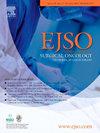Comparative analysis of the oncologic outcomes and risk factors for open conversion in laparoscopic surgery for non-metastatic colorectal cancer: A retrospective multicenter study
IF 3.5
2区 医学
Q2 ONCOLOGY
引用次数: 0
Abstract
Purpose
Laparoscopic colon surgery is now commonly used for colorectal cancer (CRC) resection. The objective of this study was to compare the oncologic outcomes between open conversion and laparoscopic surgery, and to identify risk factors for open conversion.
Methods
We retrospectively reviewed the medical records of patients who underwent curative resection for stage 0–III CRC at five Hallym University-affiliated hospitals between January 2011 and June 2021. The patients were divided into the conversion and laparoscopic groups according to whether laparoscopic surgery was completed.
Results
Out of 2231 patients, laparoscopic surgery was completed in 2131 patients and 100 (4.5 %) converted to open surgery. The operation time (P = 0.028) and postoperative hospital stay (P = 0.036) were longer in the conversion group than in the laparoscopic group. Overall (P = 0.022) and severe (Clavien–Dindo classification grade ≥3) (P = 0.048) complications were more frequent in the conversion group than in the laparoscopic group. The 5-year recurrence-free survival (RFS) rate was worse in the conversion group than in the laparoscopic group (P = 0.002). In the multivariable analysis, open conversion was not a prognostic factor for RFS (P = 0.082). Abdominal surgery history (P = 0.021), obstruction (P < 0.001), and T4 stage (P < 0.001) were independently associated with open conversion.
Conclusion
The conversion group had worse perioperative and oncologic outcomes. History of abdominal surgery, obstruction, and T4 stage were associated with open conversion. However, conversion itself was not associated with RFS.
腹腔镜手术治疗非转移性结直肠癌的肿瘤学结果和开腹手术风险因素的比较分析:一项多中心回顾性研究。
目的:腹腔镜结肠手术目前已普遍用于结直肠癌(CRC)切除术。本研究旨在比较开腹手术和腹腔镜手术的肿瘤治疗效果,并确定开腹手术的风险因素:我们回顾性地查看了2011年1月至2021年6月期间在五家韩林大学附属医院接受根治性切除术的0-III期CRC患者的病历。根据是否完成腹腔镜手术将患者分为转化组和腹腔镜组:在2231名患者中,2131人完成了腹腔镜手术,100人(4.5%)转为开腹手术。与腹腔镜手术组相比,开腹手术组的手术时间(P = 0.028)和术后住院时间(P = 0.036)更长。总并发症(P = 0.022)和严重并发症(Clavien-Dindo分级≥3级)(P = 0.048)在转换组比腹腔镜组更常见。转换组的 5 年无复发生存率(RFS)低于腹腔镜组(P = 0.002)。在多变量分析中,开腹手术转换不是RFS的预后因素(P = 0.082)。腹部手术史(P = 0.021)、梗阻(P转换组的围手术期和肿瘤学预后较差。腹部手术史、梗阻和T4分期与开腹转阴有关。然而,转换本身与RFS无关。
本文章由计算机程序翻译,如有差异,请以英文原文为准。
求助全文
约1分钟内获得全文
求助全文
来源期刊

Ejso
医学-外科
CiteScore
6.40
自引率
2.60%
发文量
1148
审稿时长
41 days
期刊介绍:
JSO - European Journal of Surgical Oncology ("the Journal of Cancer Surgery") is the Official Journal of the European Society of Surgical Oncology and BASO ~ the Association for Cancer Surgery.
The EJSO aims to advance surgical oncology research and practice through the publication of original research articles, review articles, editorials, debates and correspondence.
 求助内容:
求助内容: 应助结果提醒方式:
应助结果提醒方式:


